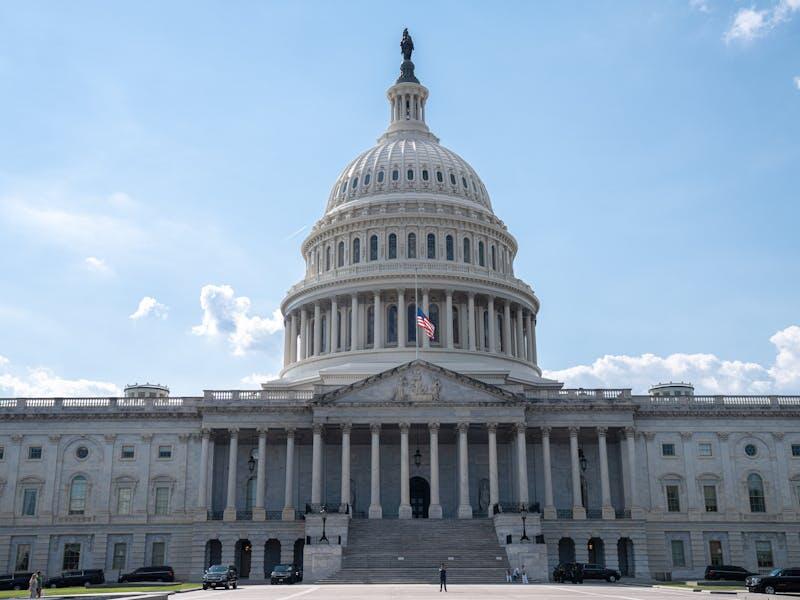
Staying ahead of legislative changes is crucial for providing your clients with optimal service and guidance. The recently enacted One Big Beautiful Bill Act (OBBBA) introduces significant changes to the tax code that will impact your clients and your practice. While the bill itself is over 1,000 pages, we're going to start by covering seven of the top tax implications in the One Big Beautiful Bill Act to help you get started.
What is the One Big Beautiful Bill Act?
The One Big Beautiful Bill Act is a United States federal statute passed by the 119th U.S. Congress and signed into law by President Trump on July 4, 2025. It contains hundreds of tax and spending provisions, including:
- Permanently extends TCJA tax rates
- Raises the State and Local Tax deduction cap (through 2028)
- Creates tax deductions for tips, overtime pay, and auto loans (through 2028)
- Updates itemized deduction limitations
- Updates enhanced international tax provisions
The bill also creates tax-deferred accounts that parents can create for their children (called Trump Accounts), increases spending for defense, makes changes to Medicare and Medicaid, and many other provisions and changes. While it's commonly referred to as the One Big Beautiful Bill Act, while the bill was in the Senate, they removed this name formally, though it's still commonly called this.
The top 7 tax takeaways from the One Big Beautiful Bill Act
While there are hundreds of provisions within the law, we're sharing the ones most likely to affect you and your clients.
Permanent Extension of Key TCJA Provisions
The OBBBA makes permanent many provisions from the TCJA that were set to expire after 2025. This provides certainty for tax planning and eliminates the "fiscal cliff" that would have occurred. Key permanent extensions include:
- Increased standard deduction
- Reduced individual tax rates
- Enhanced child tax credit by $200
- Qualified business income deduction (Section 199A)
- Increased estate and gift tax exemption amounts (raised to $15 million, indexed for inflation)
- Increased alternative minimum tax (AMT) exemption amounts with modified phaseout thresholds
- Limitation on mortgage interest deduction ($750,000 acquisition debt limit)
- Elimination of miscellaneous itemized deductions subject to the 2% floor (with an exception for educator expenses)
The permanence of these provisions allows for more stable long-term tax planning for your clients.
2. SALT cap modifications
The State and Local Tax (SALT) deduction cap was originally intruced by the TCJA, and has been significantly modified with the One Big Beautiful Bill Act. Starting in 2025, the SALT deduction limit increases to $40,000 ($20,000 for individuals and married filing separately). It rises to $40,400 in 2026, then increases by 1% annually until 2029. In 2030, the SALT cap reverts back to $10,000 unless it is extended in new legislation.
If you have high-income clients, it's important to know the new phaseout provision. The OBBBA reduces the SALT deduction by 30% of the excess modified adjusted gross income over the threshold amount ($500,000) in 2025. It raises to $505,000 in 2026 and increases by 1% for those married filing jointly. These amounts are cut in half for those filing single or married filing separately. The phaseout cannot reduce the deduction below $10,000.
This provision creates planning opportunities for clients to accelerate or defer income and deductions to maximize their SALT benefits during this window of increased limits.
3. No tax on tips
While it was called "no tax on tips" by the media, this is a bit misleading. Instead, the One Big Beautiful Bill creates a deduction for tips under new IRC Section 224. This provision allows taxpayers to deduct qualified tips received during the tax year that are reported on information statements (W-2, 1099, etc). Key features of this provision include:
- Deduction limited to $25,000
- Available for both those who itemize their deductions and those who take the standard deduction
- Phase-out starting at modified AGI of $150,000 ($300,000 for those who are married filing jointly)
- Only applies to cash tips, including credit card tips and tip sharing arrangements
- Not available for workers in specified service trades or businesses (SSTBs) as defined in Section 199A
- Available only through tax years 2025 through 2028
For business owners that receive tips, the deduction is limited to the net profit from the business. This provision represents significant tax relief for service industry workers, particularly those working in hospitality, personal services, and other traditionally tipped occupations.
4. No tax on overtime
Similar to the tip deduction, it's not that overtime isn't taxed, but the One Big Beautiful Bill creates a deduction for qualified overtime compensation under the Fair Labor Standards Act (FLSA). This provision (IRC Section 225) allows taxpayers to deduct overtime pay from their taxable income, subject to certain limitations:
- Deduction limited to $12,500 ($25,000 for joint returns)
- Available for both those who itemize deductions and those who take the standard
- Phase-out starting at modified AGI of $150,000 ($300,000 for those filing married filing jointly)
- Overtime pay does not include qualified tips
- Currently only available for tax years 2025-2028
This provision particularly benefits hourly workers who regularly work overtime, providing them with meaningful tax relief and potentially encouraging additional work hours.
5. Modification of itemized deduction limitations
The One Big Beautiful Bill Act introduces a new limitation on itemized deductions that replaces the previous "Pease limitation." Under Section 70111, itemized deductions are reduced by 2/37 of the lesser of:
- The amount of itemized deductions, or
- The amount of adjusted taxable income above the beginning of the 37% bracket
This limitation is designed to reduce the tax benefit of itemized deductions for high-income taxpayers. Importantly, taxable income used in calculating the Section 199A qualified business income deduction is computed without regard to this limitation, preserving the full benefit of the QBI deduction.
For tax professionals, this creates planning opportunities around the timing of itemized deductions and income recognition to minimize the impact of this limitation.
6. Enhanced international tax provisions
The OBBBA makes several significant changes to international tax provisions that will impact businesses with foreign operations:
- Increases the deemed paid credit for taxes attributable to tested income from 80% to 90%
- Modifies the definition of Deduction Eligible Income (DEI), replacing Foreign-Derived Intangible Income (FDII)
- Increases the Base Erosion Anti-abuse Tax (BEAT) rate from 10% to 10.5%
- Makes the look-through rule for related Controlled Foreign Corporations permanent
- Excludes Subpart F and Net CFC Tested Income inclusions from a taxpayer's Adjusted Taxable Income for business interest limitation purposes
These changes generally enhance the competitiveness of U.S. businesses operating internationally while maintaining anti-abuse provisions.
7. Casualty loss deduction expanded
The One Big Beautiful Bill Act maintains the TCJA limitation that personal casualty losses may only be deducted if they result from federally declared disasters but expands it to include certain state-declared disasters beginning in the 2025 tax year.
Qualifying state-declared disasters include any natural disaster, fire, flood or explosion designated by a state's governor and the Treasury Department. Also, in this provision, "state" includes the District of Columbia, Puerto Rico, the Virgin Islands, Guam, American Samoa, and the Northern Mariana Islands.
This expansion provides IRS disaster relief to taxpayers affected by significant disasters that may not be declared by federal agencies, creating additional opportunities for casualty loss deductions.
Learn more about the One Big Beautiful Bill with Becker CPE
The OBBBA represents a significant change in the tax code, making TCJA provisions permanent while introducing new deductions and modifications. To help you understand and implement these changes, Becker offers a wide variety of tax CPE and IRS-approved CE courses to build your skills and keep you up to date, including:
- The One Big Beautiful Bill: International Provisions
- The One Big Beautiful Bill: Business Provisions
- The One Big Beautiful Bill







